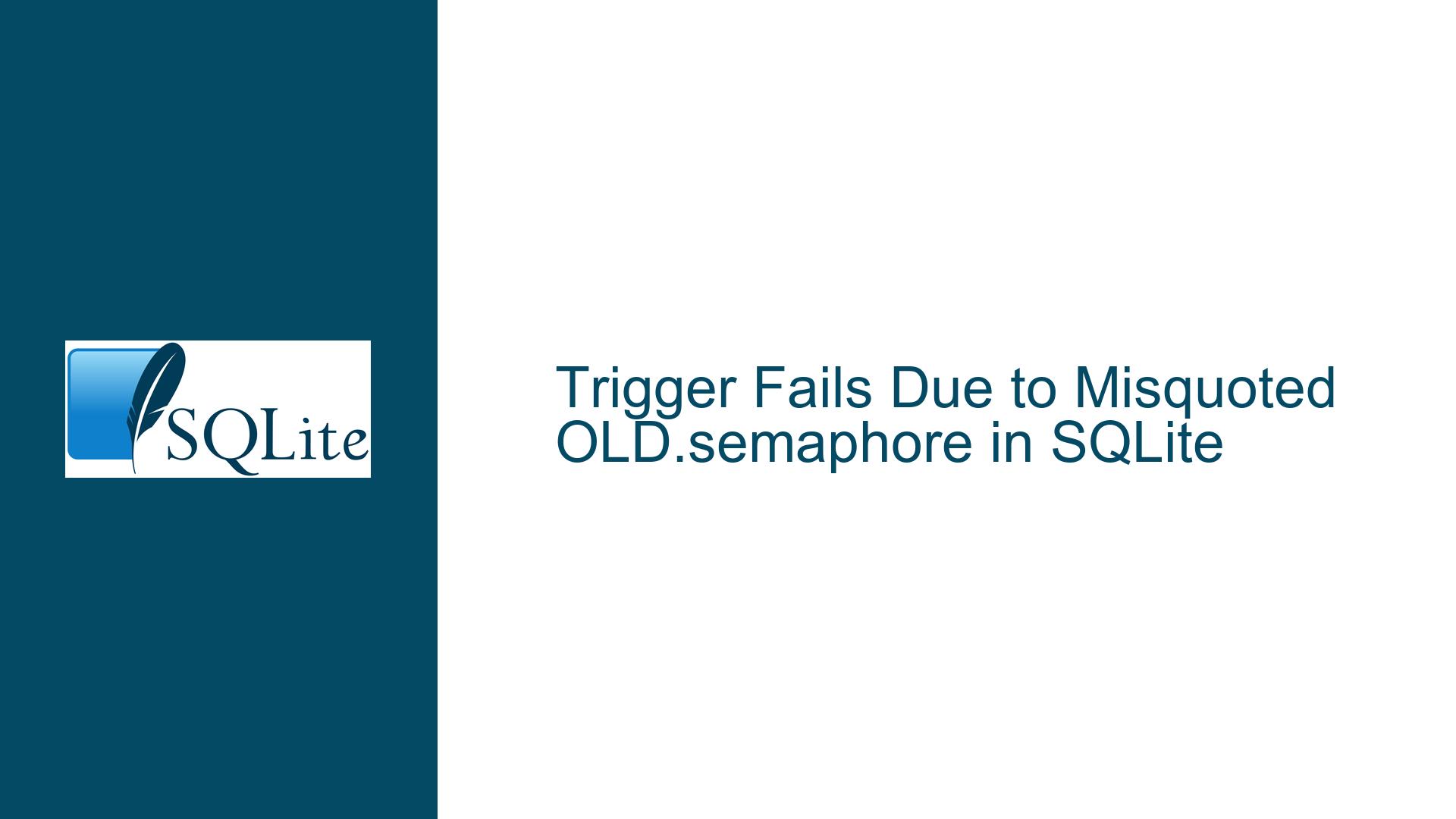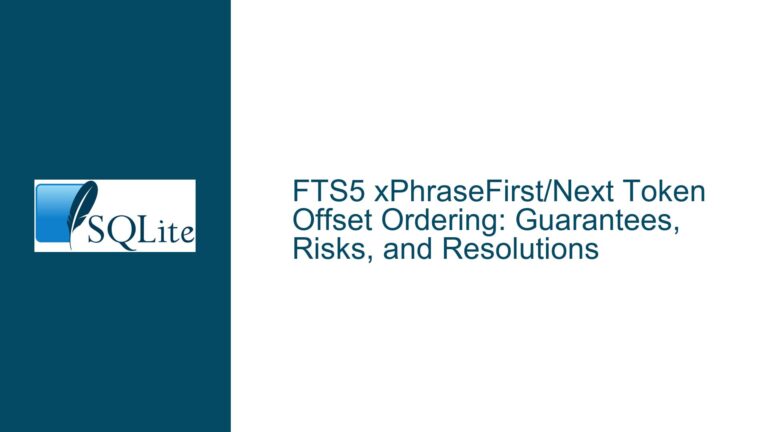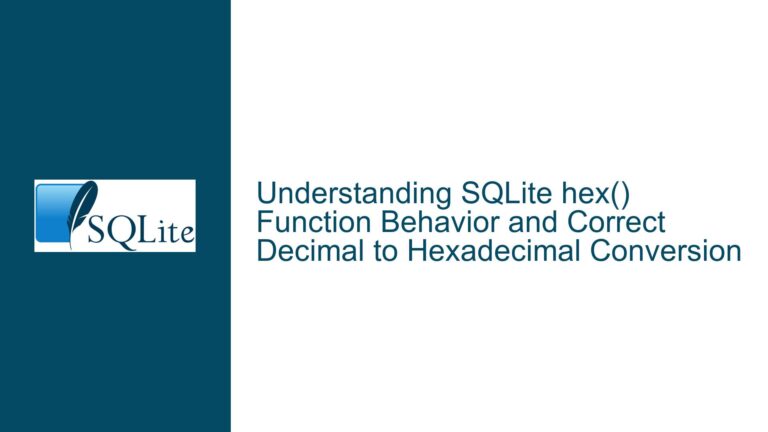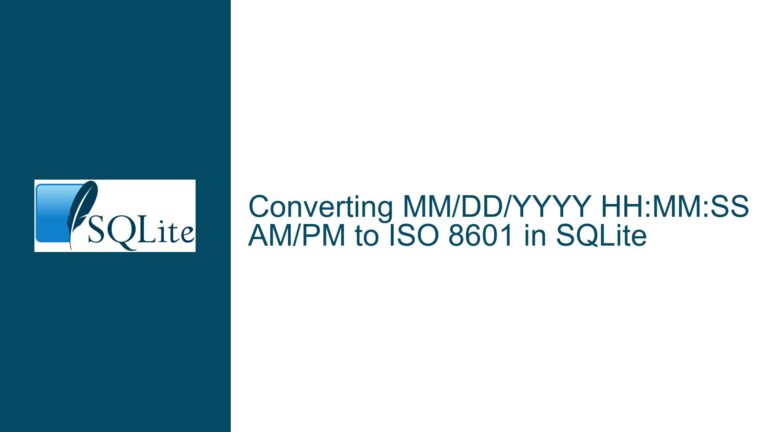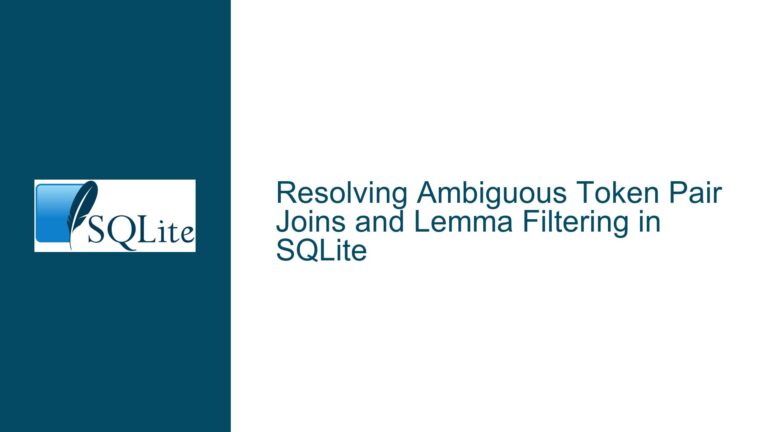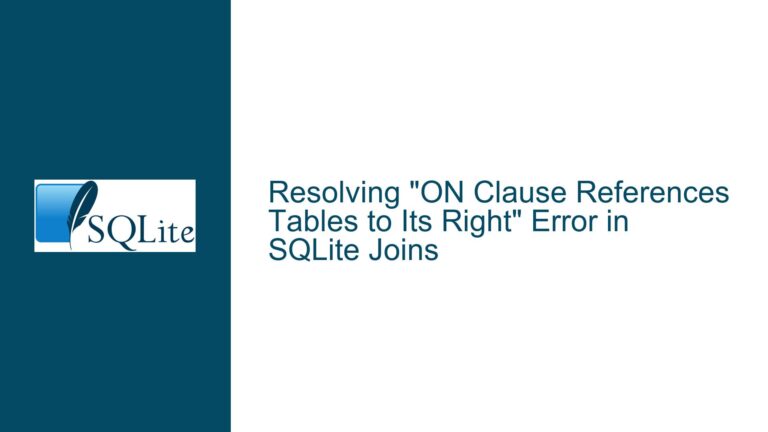Trigger Fails Due to Misquoted OLD.semaphore in SQLite
Issue Overview: Misquoted OLD.semaphore in Trigger Definition
The core issue revolves around a trigger in SQLite that fails to execute as intended due to a subtle yet critical syntax error. The trigger, named check_semaphore, is designed to enforce a semaphore-like mechanism on a table named data. The semaphore column in this table is intended to transition between three states: NULL, 0, and 1. The trigger’s purpose is to prevent a specific transition—setting the semaphore from 0 to 0—which could indicate a race condition in the application logic.
The trigger is defined as follows:
CREATE TRIGGER "check_semaphore" BEFORE UPDATE OF "semaphore" ON "data"
FOR EACH ROW
WHEN "OLD.semaphore" IS NOT NULL AND "NEW.semaphore" = 0
BEGIN
SELECT RAISE(ROLLBACK, 'Race condition.');
END;
The issue lies in the WHEN clause of the trigger, specifically in the way OLD.semaphore is referenced. The use of double quotes around "OLD.semaphore" is incorrect. In SQLite, OLD and NEW are special keywords that refer to the old and new values of the row being updated, respectively. When these keywords are used in conjunction with a column name, they should not be enclosed in double quotes. The correct syntax should be either OLD.semaphore or OLD."semaphore".
The incorrect quoting causes the trigger to misinterpret the reference to OLD.semaphore, leading to a situation where the trigger does not fire as expected. This results in the semaphore being set from 0 to 0 without raising the intended ROLLBACK error, thereby failing to prevent the race condition.
Possible Causes: Misinterpretation of OLD and NEW Keywords
The root cause of this issue is the misinterpretation of how the OLD and NEW keywords are used in SQLite triggers. These keywords are not table names or column names but rather special references to the state of the row before and after the update. When these keywords are enclosed in double quotes, SQLite interprets them as part of the column name, leading to a reference that does not exist.
In the context of the trigger definition:
WHEN "OLD.semaphore" IS NOT NULL AND "NEW.semaphore" = 0
SQLite interprets "OLD.semaphore" as a single identifier, which is not what the developer intended. The correct interpretation should be:
WHEN OLD.semaphore IS NOT NULL AND NEW.semaphore = 0
This misinterpretation is further compounded by the fact that SQLite does not throw an error when it encounters this incorrect syntax. Instead, it silently fails to execute the trigger, leading to unexpected behavior in the application.
Another contributing factor is the ambiguity in the SQLite documentation regarding the use of quotes with OLD and NEW keywords. The documentation uses quotes in a way that can be interpreted as either English-language quotes or SQL identifier quotes, leading to confusion. This ambiguity can cause developers, especially those new to SQLite, to make the same mistake.
Troubleshooting Steps, Solutions & Fixes: Correcting the Trigger Syntax
To resolve this issue, the trigger definition must be corrected to properly reference the OLD and NEW keywords without enclosing them in double quotes. The corrected trigger definition should look like this:
CREATE TRIGGER "check_semaphore" BEFORE UPDATE OF "semaphore" ON "data"
FOR EACH ROW
WHEN OLD.semaphore IS NOT NULL AND NEW.semaphore = 0
BEGIN
SELECT RAISE(ROLLBACK, 'Race condition.');
END;
This change ensures that SQLite correctly interprets OLD.semaphore and NEW.semaphore as references to the old and new values of the semaphore column, respectively.
Step-by-Step Troubleshooting:
Identify the Issue: The first step is to recognize that the trigger is not firing as expected. This can be done by running the update statements and observing that the semaphore is being set from
0to0without raising theROLLBACKerror.Review the Trigger Definition: Carefully examine the trigger definition, paying close attention to the
WHENclause. Look for any syntax errors, particularly in the wayOLDandNEWkeywords are referenced.Correct the Syntax: Remove the double quotes around
OLD.semaphoreandNEW.semaphorein theWHENclause. Ensure that the corrected syntax is used in the trigger definition.Test the Trigger: After making the correction, test the trigger by running the update statements again. Verify that the trigger now fires as expected and raises the
ROLLBACKerror when the semaphore is set from0to0.Document the Solution: Update any documentation or comments in the code to reflect the correct syntax for referencing
OLDandNEWkeywords in triggers. This will help prevent similar issues in the future.
Additional Considerations:
Version Compatibility: While the issue was identified in SQLite version 3.27.2, it is always a good practice to test the corrected trigger in the latest version of SQLite to ensure compatibility and take advantage of any bug fixes or improvements.
Code Hygiene: Although quoting identifiers is generally a good practice for code hygiene, it is important to be aware of the exceptions, such as the use of
OLDandNEWkeywords in triggers. This awareness can help prevent similar issues in the future.Documentation Clarity: The ambiguity in the SQLite documentation regarding the use of quotes with
OLDandNEWkeywords should be addressed. Clearer documentation can help prevent confusion and reduce the likelihood of similar issues arising.
Conclusion:
The issue of the trigger not working due to misquoted OLD.semaphore is a subtle but significant one that can lead to unexpected behavior in SQLite applications. By understanding the correct syntax for referencing OLD and NEW keywords in triggers and carefully reviewing the trigger definition, developers can avoid this issue and ensure that their triggers function as intended. Additionally, clearer documentation and awareness of the nuances of SQLite syntax can help prevent similar issues in the future.
